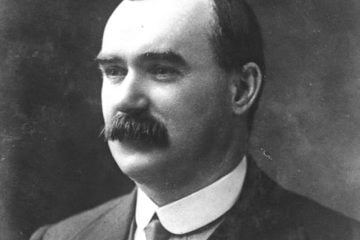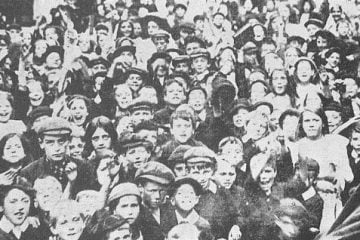Introduction
Lev Davidovich Trotsky was, alongside Lenin, one of the two greatest Marxists of the twentieth century. His whole life was entirely devoted to the cause of the working class and international socialism.
Leon Trotsky was born on the 7th of November 1879 and died on the 21st of August 1940. He was a great Ukrainian-Russian Marxist, who developed the theory of the Permanent Revolution.
From a young age Trotsky became active in the political struggle. When he was only 19, he was exiled to Siberia for his political activity. But he soon escaped and succeeded in getting out of Russia and joining Lenin in London.
Early days
In 1902 Trotsky turned up on Lenin’s doorstep in London, where he joined the staff at Lenin’s and Plakhanov’s newspaper Iskra. Lenin was very pleased with the arrival of Trotsky, and placed a lot of hope on him whose writing skills had earned him the nickname “Pero”—the Pen. Unfortunately, this early collaboration between Lenin and Trotsky was brought to an abrupt halt by the split at the Second Congress of the Russian Social Democratic Labour Party.
In early 1904, Lenin found that he had to organise “majority Committees” (Bolsheviks) to salvage something from the wreckage of the Congress. The split in the party had become an accomplished fact.
1905
On the eve of the Russo-Japanese war, Russia was in a pre-revolutionary ferment. The military defeats of the Tsarist army added to the growing discontent which erupted during the 9th January 1905 demonstration in St. Petersburg. Thus began the 1905 revolution in which Trotsky played an outstanding role.
Lunacharsky, who at that time was one of Lenin’s right hand men, writes in his memoirs: “I must say that of all the Social-Democratic leaders of 1905-06 Trotsky undoubtedly showed himself to be the best prepared. Trotsky understood better than all the others what it meant to conduct the political struggle on a broad national scale.”
At only 26 years of age, Trotsky was the chairman of the Petersburg Soviet of Workers’ Deputies. Most of the manifestos and resolutions of the Soviet were the work of Trotsky. On major occasions he spoke both for the Bolsheviks and Mensheviks and for the Soviet as a whole. However, when the revolution got defeated, Trotsky was arrested together with the other members of the soviet and exiled once more to Siberia.
Bolshevism vs Menshevism
The experience of the 1905 Revolution brought out sharply the differences between Bolshevism and Menshevism—that is, the difference between reformism and revolution. Even before 1905, during the discussions on the question of class alliances, Trotsky had developed the general lines of the Theory of the Permanent Revolution, one of the most brilliant contributions to Marxist theory.
In that time, Trotsky alone was prepared to defend the idea that it was possible that the socialist revolution would triumph in Russia before it did in Western Europe. In general, Trotsky’s position was very close to that of the Bolsheviks, as Lenin himself was later to admit. However, in 1905 only Trotsky posed the need for the socialist revolution in Russia in such a clear and bold manner. Twelve years later history was to prove him right.
1917 Russian Revolution
On the 7th of November 1917 the workers rose army units, and sailors of Petrograd rose in armed insurrection and captured the Winter Palace. This act was a key moment in a revolutionary movement that was instrumental in shaping the whole of the 20th century.
The Bolshevik Party was the most revolutionary party ever seen in history. However, in spite of its enormous experience and the accumulated strength of the leadership, at the decisive moment the Petrograd leaders wavered and entered into a crisis. In the last analysis, the fate of the Revolution fell on the shoulders of two men: Lenin and Trotsky.
The working class, for the first time in history, had captured state power and used it to overthrow the existing order and transform society and the existing social relations.
Lenin and Trotsky began the titanic task of dragging Russia out of backwardness on the basis of a nationalised planned economy. Within the space of two decades Russia had established a powerful industrial base, developed industry, science and technology and abolished illiteracy. It achieved remarkable advances in the fields of health, culture and education. This was at a time when the Western world was in the grip of mass unemployment and economic collapse in the Great Depression.
Fight against Stalinism
In 1938, Trotsky was to organise the Fourth International as a means of rallying the forces of socialist revolution. With the impending war, this became a burning question. On the basis of mighty events, Trotsky was convinced that the old Internationals were doomed and the Fourth International would have to lead the way to revolution.
In 1939, Trotsky had undertaken an assignment to write a biography of Stalin. This enraged Stalin all the more. He was becoming increasingly obsessed with Trotsky. Furthermore, Stalin had signed a Pact with Hitler in August 1939, the very thing that the Old Bolsheviks were accused of. Trotsky went on the offensive to expose Stalin. Stalin was now determined to exterminate Trotsky physically.
Trotsky managed to get asylum in Mexico. However, after a few failed assissation attempts, on the 21st of August 1940, Stalin succeeded through a hireling in his ambition to eliminate Trotsky.
Despite all the extraordinary achievements of Trotsky, the most important period of his life was its last ten years. Here one can say with absolute certainty that he fulfilled a task which nobody else could have fulfilled—namely, the fight to defend the ideas of Bolshevism and the spotless tradition of October in the teeth of the Stalinist counterrevolution. Here was Trotsky’s greatest and most indispensable contribution to Marxism and the world working class movement. It is an achievement upon which we are building to this day. Today, all that remains of the real Fourth International, as Trotsky envisaged it, is represented by the theory, policies and methods of the International Marxist Tendency.




0 Comments